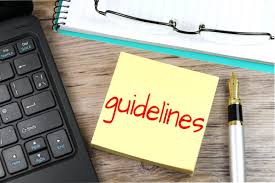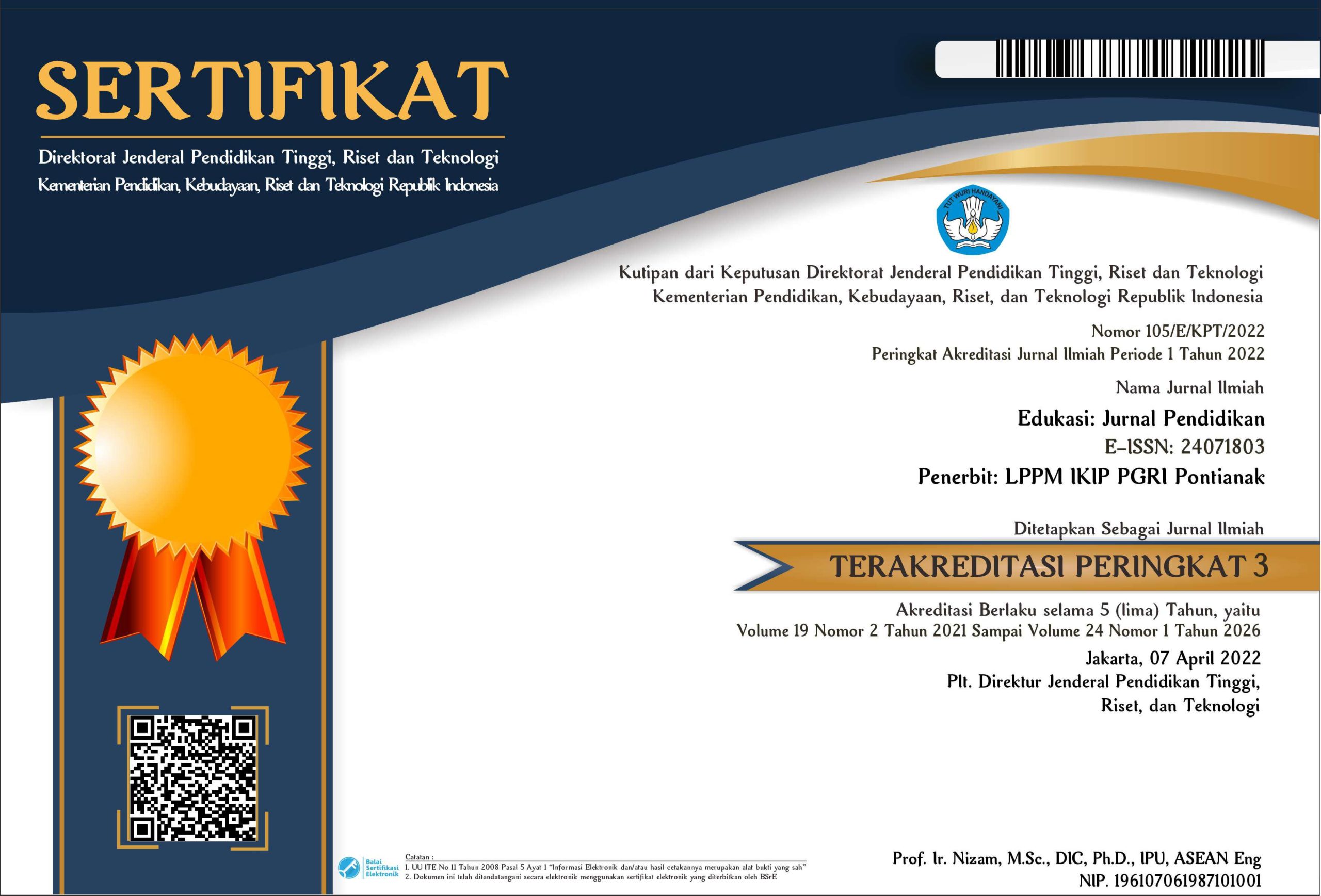Pengembangan Instrumen Tes Keterampilan Proses Sains pada Materi Fisika untuk Siswa Sekolah Menengah Pertama
DOI:
https://doi.org/10.31571/edukasi.v17i2.1250Keywords:
keterampilan proses sains, optika, tekanan, getaran dan gelombang, science process skills, optics, pressure, vibration and wavesAbstract
Abstrak
Penelitian bertujuan untuk menghasilkan perangkat instrumen penilaian untuk mengukur keterampilan proses sains pada materi optika, tekanan, dan getaran gelombang. Penelitian merupakan penelitian research and development dengan tahapan 4D yang dibatasi hanya menggunakan tiga tahapan yaitu tahap define, design, dan development. Instrumen penelitian berupa angket uji kelayakan soal yang ditujukan kepada validator dan angket respons siswa. Subjek penelitian adalah siswa kelas IX SMP Negeri yang ada di Kecamatan Sungai Kakap yang berjumlah 20 orang. Tes yang dikembangkan berbentuk pilihan ganda beralasan dan essay. Hasil penelitian menunjukkan bahwa: (1) Validitas atau kelayakan instrumen KPS yang dikembangkan berdasarkan pakar adalah valid dan layak digunakan; (2) Validitas butir soal instrumen penilaian KPS yang dikembangkan dengan kriteria valid; (3) Reliabilitas soal dari instrumen KPS sangat kuat untuk soal pilihan ganda materi optika dan getaran gelombang; reliabilitas kuat untuk soal materi tekanan; dan reliabilitas sedang untuk soal essay materi optika, tekanan, dan getaran gelombang; dan (4) Soal-soal yang dikembangkan dalam instrumen penilaian KPS didominasi soal dengan tingkat kesukaran kategori sedang.
Â
Abstract
The research aims to produce an instrument of assessment to measure science process skills in optical material, pressure and vibration waves. This research is a research and development study with 4D stages that are limited to only using three stages, namely the define, design, and development stages. The research instrument was in the form of questionnaire due diligence questions addressed to students' validators and questionnaires. The subjects were grade IX students of one of the 20 state junior high schools in Sungai Kakap. The developed test is in the form of multiple-choice reasoning and essay. The results of the study show that: (1) The validity or feasibility of the developed KPS instrument is valid and suitable for use; (2) The validity of items from the KPS assessment instruments developed with valid criteria; (3) The reliability of the questions from the KPS instrument is very strong for the matter of multiple-choice optical material and wave vibrations; strong reliability for matter of pressure material; and moderate reliability for optical material, pressure, and wave vibration essays; and (4) Questions developed in the KPS assessment instrument are dominated by problems with difficulty level medium category.
Downloads
References
Apriyani, A. 2017. Pengembangan Instrumen Asesmen Kognitif Berbasis Ketrampilan Proses Sains pada Materi Larutan Elektrolit dan Non Elektrolit. Tersedia di http://repository.lppm.unila.ac.id/5749/1/13505-29271-2-PB.pdf. Diakses tanggal 15 Maret 2018.
Arifin, R. A., Supriana, E., & Munfaridah, N. 2016. Pengembangan Multimedia Interaktif untuk Kelas XI MIPA Pokok Bahasan Dinamika Rotasi. Jurnal Riset Pendidikan Fisika, 1(1): 17-21.
Boopathiraj, C. & Chellamani, K. 2013. Analysis of Test Items on Difficulty Level and Discrimination Index in the Test for Research Education. International Journal of Social Science & Interdisciplinary Research, 2: 189-193.
Feyzioglu, B., Demirdag, B., Akyildiz, M., & Altun, E. 2012. Developing a Science Process Skills Test for Secondary Students: Validity and Reliability Study. Educational Sciences: Theory and Practice, 12(3): 1899-1906.
Feyzioglu, B. 2009. An Investigation of the Relationship Between Science Process Skills with Efficient Laboratory Use and Science Achievement in Chemistry Education. Journal of Turkish Science Education, 6(3): 114-132.
Jihad, A. & Haris. 2012. Evaluasi Pembelajaran. Multi Pressindo: Yogyakarta.
Okaviani, E., Fadiawati, N., & Kadaritna, N. 2015. Pengembangan Instrumen Asesmen Berbasis Ketrampilan Proses Sains pada Materi Hukum-Hukum Dasar Kimia. Jurnal Pendidikan dan Pembelajaran Kimia, 4(1): 324-338.
Permendikbud. 2013. Peraturan Menteri Pendidikan dan Kebudayaan Republik Indonesia Nomor 66 Tahun 2013. Tersedia di https://luk.staff.ugm.ac.id/atur/bsnp/Permendikbud66-2013SPenilaian.pdf. Diakses tanggal 20 Maret 2019.
Rustaman, N. 2005. Strategi Belajar Mengajar Biologi. Malang: Universitas Negeri Malang.
Santyasa, I. W. 2014. Asesmen dan Evaluasi Pembelajaran Fisika. Yogyakarta: Graha Ilmu.
Sugiyono. 2009. Metode Penelitian Kuantitatif, Kualitatif dan R & D. Bandung: Alfabeta.
Surapranata. 2004. Analisis, Validitas, Reliabilitas, dan Interpretasi
Hasil Tes. Bandung: Remaja Rosdakarya.
Thiagarajan, S., Doroty, S. S., & Melvyn, I. S. 1974. Instructional Development for Training Teachers of Exceptional Children. Source Book. Bloominton: Center for Innovation on Theaching the Handicapped.
Wati, S. A., Fadiawati, N., & Tania, L. 2015. Pengembangan Instrumen Asesmen Berbasis Ketrampilan Proses Sains pada Bahasan Klarifikasi Materi. Jurnal Pendidikan dan Pembelajaran Kimia, 4(2): 693-707.
Wedyawati, N. & Lisa, Y. 2018. Kelayakan Buku Ajar Mata Kuliah Pembelajaran IPA SD bagi Mahasisa PGSD. Edukasi: Jurnal Pendidikan, 16(2): 155-168.
Zamista, A. A. & Kaniawati, I. 2015. Pengembangan Tes Keterampilan Proses Sains Materi Fluida Statis Kelas X SMA/MA. Prosiding Seminar Nasional Fisika, Jakarta: Hal. 5-10.
Downloads
Published
How to Cite
Issue
Section
License
Authors who publish in this journal agree to the following terms:
- Authors retain copyright and grant the journal the right of first publication with the work simultaneously licensed under a Creative Commons Attribution License (CC-BY-NC) that allows others to share the work with an acknowledgment of the work's authorship and initial publication in this journal.
- Authors are able to enter into separate, additional contractual arrangements for the non-exclusive distribution of the journal's published version of the work (e.g., post it to an institutional repository or publish it in a book), with an acknowledgment of its initial publication in this journal.
- Authors are permitted and encouraged to post their work online (e.g., in institutional repositories or on their website) prior to and during the submission process, as it can lead to productive exchanges, as well as earlier and greater citation of published work.

 Download: 1189
Download: 1189


















